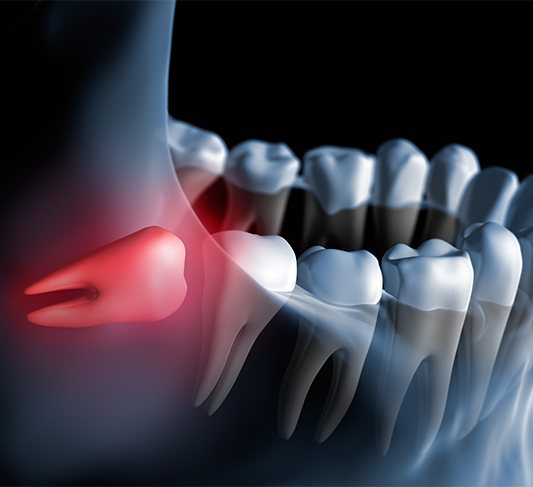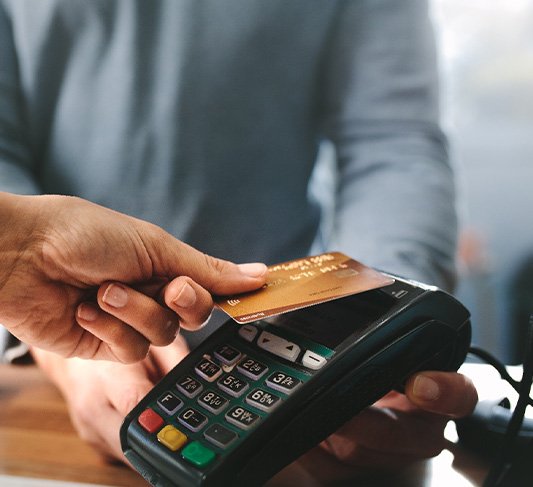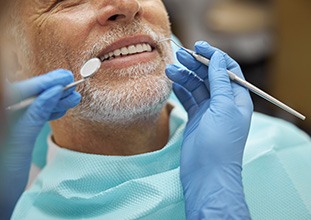Tooth Extractions – North Raleigh, NC
Does Your Tooth Need to Be Removed?
Your teeth all work together to keep your smile functioning properly, so it’s best for your oral health to preserve all of your permanent teeth for the rest of your life. However, sometimes a tooth might be too badly damaged to salvage, or it might put your other teeth at risk. In these cases and more, you can get in touch with Dr. Lisk, who will make sure the tooth is removed as gently and efficiently as possible before helping you choose a type of replacement. With him, tooth extractions in North Raleigh are nothing to stress about.
Why Choose Dr. Philip A. Lisk for Tooth Extractions?
- Calm, Relaxing Nitrous Oxide Sedation
- Meticulous Dentist with a Gentle Touch
- Multiple Options for Replacing Teeth
Reasons Why Tooth Extractions Are Necessary

A tooth extraction is typically used as a last resort once all other treatment options have been ruled out. Dr. Lisk typically recommends one if:
- The enamel is so damaged that a dental crown or filling won’t help it.
- Gum disease has made the tooth’s root weak and unstable.
- Damaged teeth need to be removed to make room for a properly fitted denture.
- A tooth has become trapped within the gums/jawbone.
- More room is needed in the mouth so the teeth can shift in response to orthodontics.
The Process of Removing a Tooth

Every tooth extraction starts with a conversation between the patient and Dr. Lisk so he can walk them through the procedure, ensuring there are no surprises. He’ll explain each step as well as answer any questions to curtail possible nerves.
The treatment itself will start with Dr. Lisk numbing the area completely with local anesthetic, and he may provide sedation dentistry if necessary as well. Once the patient can’t feel anything, he’ll use dental forceps to gently wiggle the tooth until it slips out. There is no actual “pulling” at any point! A light touch is all he needs when using the correct technique. Most patients describe feeling a little pressure while in the chair, but nothing that resembles pain.
Wisdom Tooth Extractions

When wisdom teeth don’t have enough room to grow, they get trapped under the gums and cause pain, infection, and other dental problems. More likely than not, you’ll need to have them removed to prevent long-term issues. It is sometimes possible to keep your wisdom teeth, but it all depends on the risk they pose. If you’re between the ages of 17 and 25, it’s a good idea to talk to Dr. Lisk about the possibility of a wisdom tooth extraction in the future.
Learn More About Wisdom Tooth Extractions
Understanding the Cost of a Tooth Extraction

If you’ve been informed by your dentist in North Raleigh that you need a tooth extraction, the first thought that likely popped into your head is, “Okay, and how much will this cost?” With prices rising for virtually everything, your concerns are completely valid, and our team at Dr. Philip A. Lisk Dentistry wants to make your experience as stress-free and easy to budget for as possible. If you have any questions or concerns about being able to afford treatment, never hesitate to ask our friendly team for guidance.
Factors That Influence the Cost of Tooth Extractions

No two patients are alike, and unfortunately, that means that it’s very hard to predict the cost of tooth extractions in North Raleigh without a thorough examination first. That being said, your treatment will be custom-tailored to meet your needs, and these are some of the most common, cost-affecting factors that can lower or raise the price of your extraction procedure:
- The number of teeth you need to have extracted will impact the overall cost.
- The location of the teeth that you need to have extracted, as molars are typically more complicated to remove than front teeth.
- The type of extraction, like a traditional or surgical extraction, will determine how long the procedure takes and whether surgery is needed.
- If you need to replace your extracted tooth with dental implants, a bridge, or another restoration, those treatments will incur their own separate costs.
Does Dental Insurance Cover Tooth Extractions?

If you have dental insurance, not only are we happy to be in-network with many major PPO plans, but we’ll be sure to maximize your benefits to help you save as much money as possible. Our team will file claims on your behalf whether you’re in or out-of-network, and in many cases, dental insurance companies will cover at least a portion of the cost of tooth extractions. However, it’s important to keep in mind that every plan is different, so we’ll conduct a benefits check with your insurance company before you move forward with your treatment so we can provide you with a detailed cost estimate.
Options for Making Tooth Extractions More Affordable

If you’re uninsured or you need to pay for part of the procedure out-of-pocket because your insurance won’t cover it all, we also offer other flexible ways to pay. To split the cost of your treatment into monthly payments, we partner with CareCredit, a third-party financier that offers plans with little-to-no interest.
For our patients who are uninsured, we highly recommend joining our in-house Dental Savings Plan. For just $433 a year, you’ll receive coverage for all of your basic preventive dental needs, as well as one emergency visit and periodic X-rays. While this won’t help you pay for your extraction, it will help you avoid needing another one if you come in for bi-annual checkups and cleanings!
Tooth Extraction Aftercare

Dr. Lisk and our team will cover the treatment site with gauze right after the extraction, and in the first 24 hours, it’s important that a patient does NOT use a straw, spit, smoke, or move around too much. All of these activities can prevent the formation of a clot, which is essential for healing (and avoiding a painful complication called dry socket).
After the first day, a patient should stick to a soft food diet that mostly includes items like yogurt, scrambled eggs, pudding, and(not too hot) soup. Any pain medication should be taken as directed, and the dressings will probably need to be changed a few times a day. Most patients feel completely back to normal within a week and can resume their regular diet and activity level.
Tooth Extraction FAQs
Does Getting a Tooth Extraction Hurt?
Many patients are hesitant to commit to dental treatments because they are concerned that they may hurt, and it’s understandable that you might be particularly anxious about receiving a tooth extraction. Dr. Lisk knows this and will do everything possible to ensure that your procedure remains as comfortable as possible. Before performing an extraction, he will carefully administer a local anesthetic to ensure that you feel no pain, and you may also receive a sedation treatment if necessary. After your procedure, you may experience some temporary soreness and discomfort, but strictly following your aftercare instructions will allow you to keep your recovery process smooth and complication-free. However, contact our office if you experience worsening pain or signs of infection such as fever.
Is There an Alternative to Tooth Extraction?
There may be an alternative to tooth extraction depending on what is causing the problem. If your tooth is at risk due to advanced decay, it may be possible to eliminate the infection and save the tooth by performing a root canal. If your tooth is threatened by advanced periodontal disease, we may be able to address the issue with scaling and root planning treatment. However, Dr. Lisk has probably already eliminated these possibilities if he is recommending extraction. The preservation of patients’ natural teeth is one of the primary goals of dentistry, so you can rest assured that Dr. Lisk will only recommend an extraction as a last resort to protect the health of your remaining teeth.
Can I Leave the Space Empty After a Tooth Extraction?
After having one or more of the molars in the back of their mouth removed, some patients may wonder why they should bother replacing a tooth that most people won’t be able to see. However, replacing lost teeth as soon as possible is the best way to prevent the oral health complications caused by tooth loss. For example, replacing a lost molar can allow you to chew thoroughly for better digestion, protect your gum tissue from injury, and help you avoid TMJ discomfort due to improper chewing habits. The teeth in the front of the mouth play an important role in how we form words during speech, and the loss of a single incisor or canine tooth can cause a patient to form a lisp. It’s best to schedule a tooth replacement consultation at our office soon after your extraction is complete.
Can I Smoke After My Tooth Extraction?
Tobacco products such as cigars, cigarettes, and vaping devices can hinder your gums’ ability to heal, so it’s important to refrain from smoking for at least five days after tooth extraction. However, it is ideal to avoid smoking for at least two weeks afterward. If you’ve had difficulty kicking this habit in the past, don’t hesitate to talk to Dr. Lisk during your consultation. This way, he can plan your treatment accordingly and possibly recommend a few resources to help you quit if necessary.
I Need a Checkup & Cleaning I am Worried about Bleeding Gums I Have a Cavity or Broken Tooth I am Missing One or More Teeth I Want to Improve My Smile I am Scared of the Dentist I Want to Learn about Sleep Apnea I am Experiencing Neck/Jaw Pain I am in Pain & Need Help View Our Services

